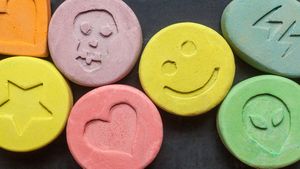MDMA: Difference between revisions
mNo edit summary |
mNo edit summary |
||
| Line 1: | Line 1: | ||
[[File:MDMA.jpg|alt=Ecstasy|thumb|'''Figure 1.''' MDMA in pill form, aka Ecstasy]] | [[File:MDMA.jpg|alt=Ecstasy|thumb|'''Figure 1.''' MDMA in pill form, aka Ecstasy]] | ||
'''MDMA, also known as ecstasy or Molly, is a synthetic drug produces both amphetamine-like stimulation and mild hallucinations.''' MDMA works by increasing the levels of serotonin, oxytocin, dopamine, and norepinephrine in the brain that might alter social perception. | '''MDMA, also known as ecstasy or Molly, is a synthetic drug produces both amphetamine-like stimulation and mild [[hallucinations]].''' MDMA works by increasing the levels of serotonin, oxytocin, dopamine, and norepinephrine in the brain that might alter social perception. | ||
=== Effects === | === Effects === | ||
MDMA | MDMA provides an experience that is mellower than with other [[psychedelics]], creating feelings of empathy. May enhance fear extinction, resulting in a shift in perspective and improved ability to process traumatic memories. May provide insight into cognition, emotional regulation, and coping strategies. Causes dopamine release that is linked to addictive behaviors. | ||
==== MDMA has a stronger in women ==== | ==== MDMA has a stronger effect in women ==== | ||
Women are more affected by MDMA's psychoactive effects than males. Women especially have greater perceptual changes, thought disturbances, and fear of loss of body control. In addition, acute adverse effects and sequelae were also more frequent in female than in male subjects. In contrast, men showed higher increases in blood pressure than women. | Women are more affected by MDMA's psychoactive effects than males<ref>'''Gender differences in the subjective effects of MDMA.''' Psychopharmacology (Berl). Liechti ME, Gamma A, Vollenweider FX. 2001 Mar 1;154(2):161-8. doi: 10.1007/s002130000648. PMID: 11314678. Accessed on 10 May 2023 via: <nowiki>https://pubmed.ncbi.nlm.nih.gov/11314678/</nowiki></ref>. Women especially have greater perceptual changes, thought disturbances, and fear of loss of body control. In addition, acute adverse effects and sequelae were also more frequent in female than in male subjects. In contrast, men showed higher increases in blood pressure than women. | ||
'''References''' | |||
Revision as of 05:11, 10 May 2023
MDMA, also known as ecstasy or Molly, is a synthetic drug produces both amphetamine-like stimulation and mild hallucinations. MDMA works by increasing the levels of serotonin, oxytocin, dopamine, and norepinephrine in the brain that might alter social perception.
Effects
MDMA provides an experience that is mellower than with other psychedelics, creating feelings of empathy. May enhance fear extinction, resulting in a shift in perspective and improved ability to process traumatic memories. May provide insight into cognition, emotional regulation, and coping strategies. Causes dopamine release that is linked to addictive behaviors.
MDMA has a stronger effect in women
Women are more affected by MDMA's psychoactive effects than males[1]. Women especially have greater perceptual changes, thought disturbances, and fear of loss of body control. In addition, acute adverse effects and sequelae were also more frequent in female than in male subjects. In contrast, men showed higher increases in blood pressure than women.
References
- ↑ Gender differences in the subjective effects of MDMA. Psychopharmacology (Berl). Liechti ME, Gamma A, Vollenweider FX. 2001 Mar 1;154(2):161-8. doi: 10.1007/s002130000648. PMID: 11314678. Accessed on 10 May 2023 via: https://pubmed.ncbi.nlm.nih.gov/11314678/
